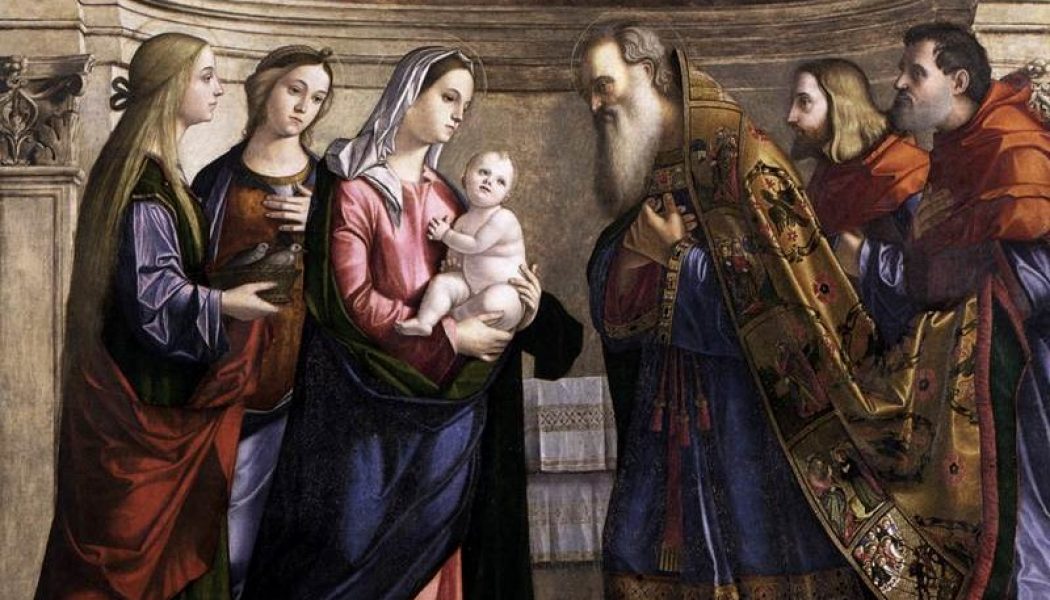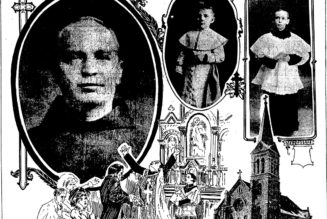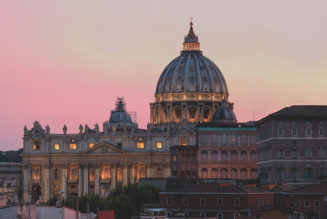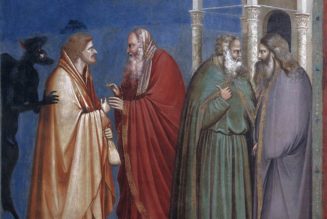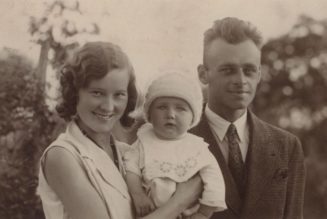
The liturgical focus of the Feast of the Presentation, which we celebrate today, is light. Christ is our light, and the people who walked in darkness have seen a great light! In the Gospel, Simeon holds the infant Jesus and calls Him “a light for revelation to the Gentiles.” Thus, this feast has long featured the carrying of candles by the faithful in procession and the blessing of candles. For this reason, the feast was often called Candlemas.
Today’s feast celebrates the “purification” of Our Lady. As a Jewish woman, she presented herself forty days after giving birth to be blessed and welcomed back to the community. I have written more on the history of that practice here: The Churching of Women.
In this reflection, we will attend to four teachings or perspectives gleaned from the readings. We are taught that our relationship with Jesus is cleansing, consoling, compelling, and communing.
Cleansing– The Gospel opens with this description: When the days were completed for their purification according to the law of Moses, Mary and Joseph took Jesus up to Jerusalem to present him to the Lord, just as it is written in the law of the Lord, Every male that opens the womb shall be consecrated to the Lord, and to offer the sacrifice of a pair of turtledoves or two young pigeons, in accordance with the dictate in the law of the Lord.
It might strike us as oddor even irritating that a woman would need to be purified after giving birth, but ancient Jewish practice exhibited great reverence for the rituals of both birth and death. On account of the deep mysteries of life represented by these events, as well as the fluids (e.g., blood, amniotic fluid) that accompanied them, a purification or blessing was deemed necessary for return to the community. (Read more at the link above.)
Remember that this is nota moral purification, for nothing immoral had been done. Rather, it was a ceremonial purification wherein one was cleansed or made fit again to enter into the public worship and liturgical actions of Israel. Consider, for example, that even in our culture a person who has been outside working and comes back sweaty and in soiled clothes is expected to bathe and put on clean clothing before going to Mass; this does not mean that there is anything sinful in good, honest, necessary work. The Jews extended this idea much further than we do today and there were detailed (frankly, often bewildering) rules about what made one unclean and how/when one should be purified. Very early on, the Church simplified and/or largely abrogated these ideas about certain foods being unclean and what made a person unclean (see Acts 15).
While we may wonder (or even scoff) at these older notions, all of us need purification and cleansing. We are sinners, and we live in a world tainted by sin. The Lord must purify us all; unless this happens, we will never be able to endure the great holiness, glory, and purity of God.
Jesus our savior alone can cleanse and purify us to make us able to endure the glory of God. The first reading describes our need for purification and points to Jesus as the one who purifies us:
But who can endure the day of [the Lord’s] coming? And who can stand when he appears? For he is like the refiner’s fire, or like the fuller’s lye. He will sit refining and purifying silver, and he will purify the sons of Levi, refining them like gold or like silver that they may offer due sacrifice to the LORD. Then the sacrifice of Judah and Jerusalem will please the LORD, as in the days of old, as in years gone by(Mal 3:2-4).
Yes, only the Lord Himself can purify us to endure His glory. Thank you, Jesus, our light and our savior, for the sanctifying grace without which we could never hope to endure and rejoice in the glory that awaits. Thank you, Jesus for your grace and mercy, by which we are able to stand before our Father and praise Him for all eternity. Thank you, Jesus, our purifier, our savior, and our Lord.
Consoling– Well aware of the burden of sin, ancient Israel longed for a savior. The pious knew well that sin brought strife, pain, and grief. Among the pious who longed for the Messiah were Simeon and Anna, who frequented the Temple looking and longing.
Of Simeon we are told:
[He] was righteous and devout, awaiting the consolation of Israel, and the Holy Spirit was upon him. It had been revealed to him by the Holy Spirit that he should not see death before he had seen the Christ of the Lord.
Of Anna, who is described as among those who were awaiting the redemption of Jerusalem, we are told:
[She was] a prophetess, the daughter of Phanuel, of the tribe of Asher. She was advanced in years, having lived seven years with her husband after her marriage, and then as a widow until she was eighty-four. She never left the temple, but worshiped night and day with fasting and prayer.
Simeon and Anna are two of the pious of Israel longing and looking for the Messiah who would save the people and bring consolation and peace.
What does it mean to have true consolation and peace? It is to be reconciled to the Father, Abba; to once again see Him and be able to walk with Him in the Garden in the cool of the morning. True consolation and peace are found only when the gates of Heaven are opened, and we look once again upon the glorious and serene face of our Father who loves us.
This is a gift that can come only by the ministry of Jesus, for no one knows the Father but the Son and anyone to whom the Son reveals Him. Jesus is our peace and our consolation by leading us back to His Father in and through His Sacred Heart and by His Holy Passion.
Holding the baby Jesus, Simeon is holding the Gift of the Father, a tremendous gift of peace and consolation come to him in a kind of prevenient way. So, Simeon can say,
Now, Master, you may let your servant go in peace, according to your word, for my eyes have seen your salvation, which you prepared in the sight of all the peoples: a light for revelation to the Gentiles, and glory for your people Israel.
Such a consolation it was to hold the infant Jesus and know that God so loved the world that He sent His only Son to save us! Simeon could now go forth in peace from this world for He had beheld the light of God’s saving love in Jesus.
Compelling– In today’s Gospel we are told that Jesus is no inconsequential figure. He is the one on whom all human history, collective and personal, hinges. The “hinge” is our choice either for or against Jesus.
Simeon says to Mary,
Behold, this child is destined for the fall and rise of many in Israel, and to be a sign that will be contradicted—and you yourself a sword will pierce—so that the thoughts of many hearts may be revealed.
Jesus compels a choice.We are free to choose for or against Him, but we mustchoose. Upon this choice depends our rise or fall.
Jesus says, Whoever is not with me is against me, and whoever does not gather with me scatters(Matt 12:30).
St. Paul writes (in Acts), In the past God overlooked ignorance, but now he commands all people everywhere to repent. For he has set a day when he will judge the world with justice by the man he has appointed. He has given proof of this to everyone by raising him from the dead(Acts 17:30). And in Corinthians he writes, We are therefore Christ’s ambassadors, as though God were making his appeal through us. We implore you on Christ’s behalf: Be reconciled to God(2 Cor 5:20).
Where will you spend eternity? That depends on your stance toward Jesus. Will you choose Him? You are free to choose, but you are not free not to choose! On this choice your very life will rise or fall.
Communing– Jesus did not merely save us from on high. He became flesh and lived among us.
In today’s Gospel we read,
When they had fulfilled all the prescriptions of the law of the Lord, they returned to Galilee, to their own town of Nazareth. The child grew and became strong, filled with wisdom; and the favor of God was upon him.
Consider the intimacy of Jesus dwelling among us then and tabernacled among us now in the Blessed Sacrament and in the temple of our heart through His Spirit. Our Lord seeks communion with us and is not ashamed to call us His brethren (Heb 2:11).
On this Feast of the Presentation, allow the Lord into the temple of your heart. Give Him access to your soul by receiving Him in Holy Communion and seeking His presence tabernacled in our churches. Today, Jesus is presented not only in the ancient temple but to you. Reach out to hold on to Him. Like Simeon, receive Him in your heart. Like Anna, run and tell others to come.
Jesus, our light and our salvation, is here.He brings with Him cleansing, consoling, and communing. He also compelsa choice. Choose Him now; run to Him. He is here, and He is calling!
[embedded content]
